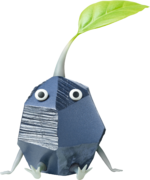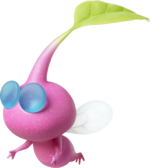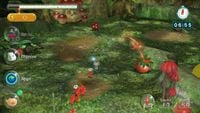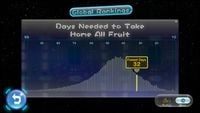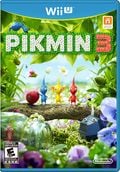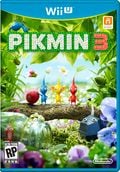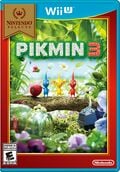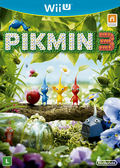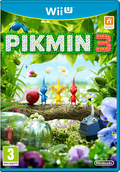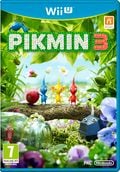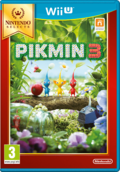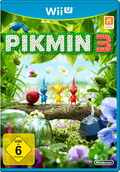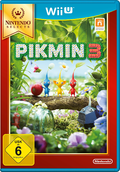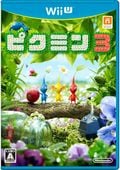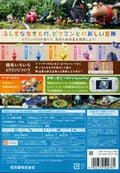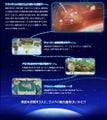Pikmin 3
| Pikmin 3 | |
|---|---|
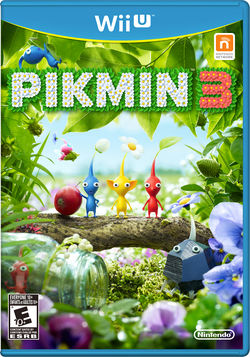
| |
| US boxart. | |
| Japanese name | ピクミン 3? |
| Rating | |
| Console | Wii U |
| Developer | Nintendo EAD |
| Publisher | Nintendo |
| Genre | Real-time strategy |
| Players | Single-player (Story Mode) 1 or 2 players (Mission Mode) 2 players (Bingo Battle) |
| Release date | |
| Japan | July 13th, 2013 |
| North America | August 4th, 2013 |
| Europe | July 26th, 2013 |
| Australia | July 27th, 2013 |
| South Korea | N/A |
| Related games | |
| Predecessor | Pikmin 2 |
| Re-release | Pikmin 3 Deluxe |
Pikmin 3 is the third installment in the Pikmin series, released in 2013 for the Wii U. The game takes place some time after the events of Pikmin 2, and sees Alph, Brittany, and Charlie from the planet of Koppai landing on PNF-404 to collect fruit to avoid a planet-wide food crisis. Elements new to the series include two new Pikmin types, the ability to throw leaders and automate their movement, and an in-game information terminal, the KopPad. The game was also ported to the Nintendo Switch with added content, under the title Pikmin 3 Deluxe. The next game released in the series is the spin-off game Hey! Pikmin, which takes place after Pikmin 3 (since the ship recognizes the Pikmin types first discovered in Pikmin 3[1][2]). A direct sequel, presumably called Pikmin 4, has been confirmed to be in development, but has not been officially announced.
Plot
The story takes place in the galactic 21st century. The planet of Koppai is facing an inevitable doomsday due to a booming population growth, and a "basic lack of planning" that resulted in the depletion of most food resources. They send unmanned scout vessels, called SPEROs, out into space to search for a planet containing edible matter. As SPEROs returned with no data, and their hopes were dying out, the final one arrives with coordinates to PNF-404, which the Koppaites believe to be an uncharted planet. Three explorers are sent to PNF-404 to retrieve seeds to bring back and cultivate on Koppai. The crew is composed of Alph, a young engineer, Brittany, a botanist, and Charlie, the captain of their ship, the S.S. Drake. As they approach the atmosphere of PNF-404, the Drake malfunctions and ejects the three explorers before plummeting to the surface of the planet.
Charlie regains consciousness in the Distant Tundra, where he finds a group of wild Yellow Pikmin which he quickly befriends. After learning how to control these Pikmin to his every command, Charlie takes advantage of this situation and destroys several Spotcap and Kingcaps using the Pikmin. Charlie and the Pikmin then enter a a cave where they encounter Phosbats. Suddenly, an invisible, flying creature lunges at Charlie and consumes him while the Pikmin flee.
Meanwhile, Alph, following his descent from the impact of the Drake's crash, wakes up in the Tropical Wilds, and discovers a Red Onion and its Pikmin, which he quickly uses to help him find his missing KopPad and the S.S. Drake, which laid nearby. It is in good shape, aside from missing a component that renders it incapable of activating its warp drive – the cosmic drive key – which is needed to return to Koppai.
Brittany lands in the Garden of Hope and finds herself trapped until Alph rescues her by using the newly-discovered Rock Pikmin. Later they arrive at the Distant Tundra where Brittany is ejected from the Drake again due to them hitting a tree in the storm. She lands in a cave and finds Yellow Pikmin. With the Pikmin, she escapes the cave and reunites with Alph. Shortly after this, the duo fight the Vehemoth Phosbat, and after defeating it, they free Captain Charlie. Charlie reveals that he found a data file stating that Captain Olimar has the cosmic drive key.
Later on, the explorers begin to receive signals from an unknown source. This eventually leads them to finding that Louie has crashed onto the planet, whom they rescue from the Scornet Maestro. The day after rescuing him, he steals all their juice and tries to escape to the Hocotate ship, only to be eaten by a Quaggled Mireclops and rescued again by the three explorers. After this second encounter, he is tied up to prevent him from causing the leaders trouble again, and he gives them the coordinates to the Formidable Oak, where his colleague is being held captive.
Upon arriving at the final area, the explorers learn that Louie's partner, Captain Olimar, was sent to the planet by Hocotate Freight to try and find more treasure in order to pay back a second loan and buy back the S.S. Dolphin, but ended up crashing and completely destroying the Hocotate ship. Alone on the surface, he was abducted by a large, overprotective creature called the Plasm Wraith, which tries to mother him and refuses to let him go. Eventually, the Koppaites free Olimar from the Wraith and escape with him on the S.S. Drake as the creature screams at them for taking Olimar away.
Endings
There are 3 possible endings for the game, all related to the amount of fruit obtained. The bad ending is seen when the player obtains less than half of the fruit on PNF-404 (32 or less). The narrator implies that the amount of seeds obtained here will not be enough to solve the Koppai famine. The good ending is seen when the player gets at least half the fruits, but not all of them (from 33 to 65). Here, the narrator implies that the seeds obtained here can be used to stop the crisis if used properly; he also discusses how the leaders have learned the basics of teamwork and planning. Lastly, the best possible ending is seen from obtaining all 66 fruits. In this ending, the narrator implies that Koppai survived the food crisis, and that crashing of both ships was not by accident; once again, he mentions how the explorers have mastered teamwork. It is not known yet which ending is considered canon, though it is likely the best ending.
At the end of the credits, the Pikmin are seen singing and coexisting with both themselves and the creatures of the Pikmin planet. However, this is interrupted when the Pikmin spot a flaming object crashing onto the surface of the planet, and they run towards it. The Voyage Log entry for the last day states that Louie did not board the ship with Olimar and the Koppaites. Although nothing else is elaborated in the original release of Pikmin 3, Olimar's Comeback in Pikmin 3 Deluxe goes into more detail about this ending.
Gameplay
Pikmin 3 is a 3D strategy game, like the other main games in the Pikmin series. The main story mode is a single-player experience in which the player controls an army of Pikmin by moving a leader around. The Pikmin can be thrown, whistled, dismissed, and ordered to charge, among other control options. Using these methods, Pikmin can carry objects such as fruit back to the base, and they can attack enemies and obstacles to clear paths for carrying.
The gameplay takes place across several in-game days, each of which is 13 minutes long. At the start of the day, the player will select an area to land in. That area can be explored for the rest of the day, and the player is tasked with doing as much as they can from the many tasks available.
Over the course of the game, the player gains access to new types of Pikmin, additional leaders, and additional areas. The order these are unlocked in is linear, but the game has an element of non-linearity in that past areas can be revisited to collect more fruit with the new Pikmin types the player gains.
While Pikmin 3 contains many recurring gameplay elements from earlier games in the series, it also changes some mechanics and introduces new ones that make it stand out from its predecessors:
- The game has a day limit, similar to the first game. However, this time limit can be extended based on how many bottles of juice the player has left, which can be restored by collecting fruit. The player can extend their playtime up to 99 days by collecting all of the game's fruit.
- The battle mechanics of the series have been greatly enhanced; rather than just throwing Pikmin onto the body of a larger enemy, the Pikmin can now be aimed to latch onto specific parts of enemies, which can cause different reactions and different amounts of damage. For example, throwing a Pikmin directly at a Bulborb's eye will cause it to recoil and spit out any snatched Pikmin.
- The game's graphics are much more detailed and much more natural-looking, thanks to the enhanced resolution and graphical capabilities the Wii U provides.
- The way Pikmin follow the leader has changed. Rather than marching in an orderly group, they will each move individually and follow the player in a much more realistic swarm. They will also trace the leader's path instead of following them in a straight line and risking getting stuck behind corners. Despite this, they will still be thrown accordingly, depending on which Pikmin is in standby.
- The swarm feature present in the original two games has been removed in favor of the lock-on and charge mechanics, where Pikmin all charge towards a target at once.
- The health system has partially changed. All enemies (bosses included) retain their damage overnight, and the carcasses of bosses will remain in their arenas for a day after they are defeated. Every boss in the game can be dragged back to base for a 50-seed boost of the selected Pikmin type.
- The way the player manages Onions has changed. Unlike in the first two games, all Onions discovered in the game merge with the Red Onion at the end of the day to become a single, "Master Onion". Onions also release rings of light in the afternoon to signify safe zones when night comes.
- Poison has been removed as a hazard, as Purple Pikmin and White Pikmin are only present in Mission Mode. Also, electricity has been nerfed and no longer kills Pikmin, instead leaving them on the ground completely immobilized, until they are called back.
- Pikmin do not go down in maturity level, only up.
Alternative game modes
Mission Mode
- Main article: Mission Mode.
Mission Mode features timed challenges where the aim is to get the highest score. It can be played with 1 or 2 players. There are three modes to play: Collect Treasure!, Battle Enemies!, and Defeat Bosses! Each challenge is 5 to 15 minutes long and provides the player with a set number of starting Pikmin. The mode is similar to Challenge Mode from the first 2 games.
Bingo Battle
- Main article: Bingo Battle.
Bingo Battle is a 2-player competitive mode where the goal is to fill up a bingo card filled with enemies, fruit, and marbles. The players must strategically find ways to collect the items needed to make a bingo before their opponent can do so. The mode is similar to 2-Player Battle from Pikmin 2.
Content
Pikmin
The game has 5 types of Pikmin: Red Pikmin, Rock Pikmin, Yellow Pikmin, Winged Pikmin, and Blue Pikmin, unlocked in that order. Red, Yellow, and Blue Pikmin return from the first 2 games, but Rock and Winged Pikmin are new, as shown by their lavender-colored flowers, and are unique in the sense that they are named after their abilities and appearance, rather than their color. Purple and White Pikmin are only available in Mission Mode and Bingo Battle mode; they are not found in Story Mode.
Rock Pikmin
- Main article: Rock Pikmin.
Rock Pikmin take the form of small polished pebbles with a stem. They are immune to attacks involving blunt force, such as crushing or piercing. When thrown, they deal a large amount of damage. They are used to destroy crystalline obstacles, and are the second type found, in the Garden of Hope.
Winged Pikmin
- Main article: Winged Pikmin.
Winged Pikmin are small, pink Pikmin resembling bees, and are capable of flight. This makes them partially immune to ground hazards, such as bodies of water (as they will simply fly over them) and crushing. They are weak in battle, and are the fourth type to be found, in the Twilight River. They can fly over low walls and water, allowing them to take shortcuts when carrying items.
Areas
The game is split into five areas, and caves do not return from Pikmin 2. Some sections of some areas do take place inside caves, but they're still part of the normal area.
- Tropical Wilds: A tropical coastal area with thick vegetation. Alph lands here and finds Red Pikmin at the start of the game.
- Garden of Hope: A lush garden with several man-made elements. Rock Pikmin and Blue Pikmin are found here, and Brittany first lands here.
- Distant Tundra: A snowy tundra with significant topographic variation. Yellow Pikmin are found here, and Charlie first lands here.
- Twilight River: A flowing river in a forest with falling leaves. Winged Pikmin are found here.
- Formidable Oak: A termite mound in a desert. This area has no fruit and is mostly a puzzle surrounding the final boss.
Fruits
- See: Fruit
Fruits are the main collectible item in Pikmin 3, as the leaders from Koppai are tasked with recovering as many as possible to avert a food crisis. Besides providing seeds that can be used on Koppai, the fruits are also turned into juice to provide nourishment for the leaders on their adventure. If the leaders run out, they will starve, and their mission will fail.
Enemies
- See: Enemies in Pikmin 3
Enemies in Pikmin 3 are diverse and alien-like creatures, and their designs are more natural compared to the previous games, as well as more complex, now reacting to Pikmin and attacks in ways not seen before.
Plants and fungi
Plants and fungi in Pikmin 3 resemble the ones on Earth, but unlike in the previous game, a few of them have an important purpose, allowing leaders and Pikmin to hide under them, while others serve as unique objects in the environment that promote exploration or the usage of new Pikmin types.
Characters
- Alph
- Brittany
- Captain Charlie
- Captain Olimar (only playable in Mission Mode and Bingo Battle)
- Louie (only playable in Mission Mode and Bingo Battle)
Controls
- Main article: Controls.
Pikmin 3 features a total of four different control schemes, and two display modes.
The four ways to control are as follows:
- Wii U GamePad classic: With this control scheme, players use the entire GamePad's buttons to control the game.
- Wii U GamePad Stylus: In Stylus mode, players use the left side of the GamePad's buttons to control some actions, while the right hand is used to tap on the screen to control Pikmin. This mode was added via a patch rolled out on May 29th, 2014, and is similar to Pikmin Adventure's control scheme.
- Wii Remote + Nunchuk: This control scheme is nearly identical to the control scheme in the New Play Control! version of Pikmin and Pikmin 2.
- Wii U Pro Controller: The Pro Controller mimics the GameCube controls as a control method.
Off-TV Play
The game allows for off-TV play, as most Wii U games do. It can be toggled at almost all times during the game by pressing ![]() . With it off, players see the action on their television, and use the GamePad as the KopPad, as well as the main controller, if they so choose. With this configuration, the KopPad will display the radar app, which updates in real time. With Off-TV Play on, the action is presented on the GamePad's screen while the TV screen merely points the player to the GamePad with the occasional Pikmin running across the bottom of the screen. To access the KopPad, players need to press a specific button.
. With it off, players see the action on their television, and use the GamePad as the KopPad, as well as the main controller, if they so choose. With this configuration, the KopPad will display the radar app, which updates in real time. With Off-TV Play on, the action is presented on the GamePad's screen while the TV screen merely points the player to the GamePad with the occasional Pikmin running across the bottom of the screen. To access the KopPad, players need to press a specific button.
With Off-TV Play on, the Wii Remote must be aimed at the GamePad instead of the TV's sensor bar. While panning the radar on the KopPad, the player can see an overhead view of the area on the TV screen, which is only possible with Off-TV Play disabled.
Online features
Miiverse support
- Main article: Miiverse.
Like all Wii U software, Pikmin 3 had a community for Nintendo Network users to make posts about the game. All users were able to make posts, even those who didn't own the game.
Besides that, using the KopPad, it is possible to take highly-detailed pictures from the perspective of a leader, using the Wii U GamePad. Players could then share their pictures over Nintendo's Miiverse service, on the Pikmin 3 community.
Global rankings
Pikmin 3 has an online global ranking system, made available after update 1.1.0. Every time the player completes story mode or a mission, their day/fruit total or score will be sent to Nintendo's servers. With this data, information can be generated about how many players reached different goals, as well as the world records. This data can be seen in-game through the global ranking screens, accessible through the day selection menu, for story mode statistics, and through a mission's briefing menu, for that mission's statistics. They are also available on the final report when the player finishes story mode, or the mission results when the player completes a mission.
This screen shows a bar chart that represents the players that achieved a given score. The higher a bar is, the more players have reached it. The altitude isn't labeled, so this chart can't be used to know exactly how many players got a score, but it can be used to show the most popular results. The columns that represent the score the player just got (if this screen is accessed via story mode or mission completion) and the best score registered in the saved game become highlighted, with a marker on top. If either of these two is beyond the range of the chart, the marker will point to the right side of the screen, and if both are very close to one another, it will just swap between the two over time. In Mission Mode rankings, because the world record scores are so rarely obtained, and would be nearly impossible to understand in the chart, a frame announcing the world record can be seen on the top-right corner. The bottom-right corner of this screen toggles between the two different metrics – fruits and days for story mode, solo and co-op for Mission Mode.
On the story mode global rankings, there's a fruit chart and a day chart. The fruit chart shows how many players have recovered X pieces of fruit prior to completing the game. This chart starts at 0, with some players getting it to go up to 65, while others see it top at 66. The reason for this behavior is unknown. The days chart shows how many players took X days to complete the game with all fruits collected. It goes from 99 to 10. The Mission Mode charts show the final scores players got, with one chart for solo player completions, and another for co-op. The scores shown here are rounded for simplification's sake.
If the player tries to view global rankings, but the global ranking data hasn't been updated in a while, the game will ask the player “Use SpotPass to receive global ranking data from Nintendo for this software?”, with the options "Cancel" and "OK". Accepting will fetch the latest ranking data from Nintendo's servers. The message “This Wii U has been configured to allow the use of SpotPass for this software.” confirms that the data was obtained successfully. It will be impossible to see the rankings until the question is accepted. This prompt can also come up at times when the player turns the game on.
Since at least July of 2018, some impossible Mission Mode scores have been added to the list. For instance, the world record for Tropical Forest (Collect Treasure!) is 14710, meaning that player completed the mission in 1 second, which is not normally possible. Because of this, knowing the legitimate world records is nearly impossible. So far, these fraudulent scores are still on the leaderboards, and have not been cleaned by Nintendo.
Lists
Quotes
|
This article is a stub. You can help Pikipedia by expanding it. |
- See: Pikmin 3 voyage log
- See: Brittany's notes
Soundtrack
- See: Music in Pikmin 3
References to other series
Easter eggs and secrets
Regional differences
Mistakes
- See: Mistakes in Pikmin 3
Glitches
- See: Glitches in Pikmin 3
Prerelease information
Unused content
History
Development
Before Pikmin 3's development started, the developers tried creating Pikmin games on both the Gameboy Advance and the Nintendo 3DS. The experience was deemed too weak on those consoles, and Shigeru Miyamoto was not pleased.[3] Development was later moved to the Wii. This was first hinted at in 2007 during an interview with IGN. Shigeru Miyamoto told IGN, "I certainly don't think we've seen the last of Pikmin. I definitely would like to do something with them, and I think the Wii interface in particular is very well suited to that franchise." On 2008, the game was confirmed to come out for the Wii, but at E3 2011, a new announcement revealed that development had moved over to the Wii U.
A future installment was confirmed at E3 2008, at Nintendo's Developer Roundtable, where all that was mentioned was that Miyamoto was working on a future installment.[4] At E3 2011, Miyamoto stated at his roundtable that Pikmin 3 was moved from the Wii to the Wii U, noting that the special GamePad controller and the HD visuals would better complement the series.[5] E3 2012 marked the first appearance of Pikmin 3 gameplay, shown off at Nintendo's press conference. Basic gameplay, HD visuals, the GamePad interface, and Rock Pikmin were shown off. It was proposed to be a launch title, but was later pushed back. It was shown off once again at E3 2013, as Miyamoto gave a small presentation on the game. Pikmin 3 eventually launched towards the end of summer in 2013. Miyamoto stated in a Polygon interview that the Pikmin Short Movies were intended to launch on the 3DS prior to the launch of Pikmin 3[6]. Though it didn't come out alongside the game, it eventually was announced in November of 2014.
Release
Pikmin 3 was first planned to be a launch title alongside the Wii U[7]. As development went on, however, the game was pushed back to "launch window", which spanned from November 18th, 2012 to March 31st, 2013. The game was eventually delayed again, now setting a release date during the summer season.[8] Pikmin 3 eventually launched on July 13th, 2013 in Japan, and July 26th, July 27th, and August 4th, in Europe, Australia, and North America, respectively. The Japanese version of the game is only available in Japanese, while the American version is available in American English, American Spanish, and Canadian French, and the European version of the game is available in European English, European French, German, Italian, and European Spanish.
Nintendo of America held an event from July 20th, 2013 to July 21st, 2013, in which fans could visit a participating GameStop or GAME store to play a special demo of the Tropical Wilds stage. Those who participated were told they could get a download code to get Pikmin 3 a day early. However, a major problem arose with the SKUs, and only about two thirds of the customers actually got a download code that worked.
Reception
The game received generally positive reviews from most reviewers. The game was praised for its well thought-out gameplay, graphics, and innovations. Famitsū gave the game a cumulative score of 37/40, with three reviewers giving a 9/10 and one reviewer giving it a perfect 10. The main complaint that most reviewers, such as IGN, had was about the game's short campaign, compared to Pikmin 2's. IGN gave the game an 8.8/10.
The game received a large fan following before and after the game's release. This following continued on to the holiday season of 2013 with the last downloadable content pack coming out then. With bigger Wii U titles approaching, such as Donkey Kong Country: Tropical Freeze, the fan following of the game slowly died out. Nintendo also offered a free downloadable game with the purchase of Mario Kart 8, with one of the options being Pikmin 3. However, the fandom continued to be outclassed with bigger titles such as Super Smash Bros. for Nintendo 3DS and Wii U.
Versions
Following Pikmin 3's release, some software updates were eventually released for the game. Their main purpose is to enable the download of the DLC packs, but they also fix some glitches and improve some gameplay features. Each update changes the game's internal version number.
On top of that, there are three regional versions of the game: the Japanese version, the North American version, and the European and Australian version. The only difference between these versions is the game's script: it's in Japanese in Japan, American English in North America, and British English in Europe, along with other European languages. All of these versions have received the exact same software updates, and keep their differences all throughout their lifespan.
Downloadable content
- See: Downloadable content
Nintendo has so far offered three downloadable content packs, all for either Battle enemies! or Collect treasure!. They cost a grand total of $8.97 / €8.97 / £8.37.
Demo version
An eShop demo for Pikmin 3 was released following the launch of the Pikmin Short Movies, as a way for new fans to try out the series. In the demo, the player can play up until they defeat the Armored Mawdad and collect the Data Glutton in Story mode, at which point the game will prompt the player to buy the full version. Tropical Forest and Thirsty Desert in the Collect Treasure! section of Mission Mode are also available. Battle Enemies! remains inaccessible, and downloadable content cannot be purchased. In Defeat Bosses!, only the Armored Mawdad can be challenged. Bingo Battle is not available in the demo. Save data can be transferred over from the demo to the full game. The story will also end if the player spends five days on the planet without defeating the Armored Mawdad.
Re-releases
On February 12th, 2016, it was announced that Pikmin 3 would be re-released in the Nintendo Selects lineup on March 11th, 2016, along with other games.[9]
On August 5th, 2020, an enhanced port was revealed for the Nintendo Switch, titled Pikmin 3 Deluxe. Following this announcement, the Wii U original game and its demo were removed from the Wii U eShop, though it returned on September 4th, 2020.[10]
Blurbs
Why Wii U? booklet
“Pikmin 3 is a fully reimagined, mass-action strategy title from the critically acclaimed Pikmin series. Players will discover a beautiful world filled with strange creatures and take command of a swarm of ant-like Pikmin trying to survive. The world is densely packed with treasures and enemies, which make the game much more action focused and fills it with layers of potential strategies and paths, adding greater replayability to the challenge modes.”
Case blurb
“Explore an alien worlds with the help of your Pikmin army!”
“Take command of three tiny explorers and a legion of tenacious Pikmin in a fight for survival. Your loyal swarm of Pikmin will battle enemies, build pathways, and collect food to save your depleted home planet.”
Connections to other games
- See also: Canon.
Pikmin 3's plot is not related to any other game's plot, although Olimar's initial exploration of PNF-404 in Pikmin is referred to a couple of times, mostly in data files. All of the elements from Pikmin and Pikmin 2 are explained inside Pikmin 3.
Credits
- See: Pikmin 3 credits
Media
Logos
Game covers
Promotional artwork
Wallpapers
- See also: Promotional material.
Videos
Trivia
- The "3" in the game's logo was originally lavender, much like the color of the flowers seen on the Winged and Rock Pikmin. However, in January 2013, the logo was changed to have orange flowers compose the "3", much like the Pikmin's flowers when under the effect of the ultra-spicy spray.
- Pikmin 3's box art is likely a reference to the Japanese box art for Pikmin; both depict a standing Blue Pikmin, Yellow Pikmin, and Red Pikmin in that order, with the maturities bud, flower, and leaf respectively. Their stems also lean to the right in both boxes.
- Unlike other main Pikmin games, defeating the final boss of Pikmin 3 immediately triggers the end of the game, without having to carry back any object.
- This is the only game in the Pikmin series that does not contain any scientific notes on new flora and fauna.
- The fastest the game can be 100% completed in is 10 days.
- To help advertise Pikmin 3, Nintendo of Canada participated in the 2013 Red Bull Flugtag event, with some representatives dressed in Pikmin and leader suits riding a Winged Pikmin aircraft.[11] The aircraft didn't hover much and dipped right away, awarding the participants a total score of 16.24.[12]
- In the bottom-left corner of the box art, there is a Red Pikmin inside a bottle, similar to the short movie Treasure in a Bottle.
Names in other languages
| Language | Name | Meaning |
|---|---|---|
| Pikmin 3 | - | |
| Pikmin 3 | - | |
| Pikmin 3 | - | |
| Pikmin 3 | - |
See also
External links
- Wikipedia's article on Pikmin 3
- StrategyWiki's article on Pikmin 3
- NintendoWiki's article on Pikmin 3
- Japanese website
- American website
- European website
- Australian website
- Game manual
References
- ^ “Ah! Those are Rock Pikmin. They're strong enough to break solid objects, such as crystals. If anything get in you're way, call on a Rock Pikmin to bust right through!” – The S.S. Dolphin II in introducing Rock Pikmin
- ^ “Winged Pikmin, eh? Those will be nice to have around if you fall from a high place. Unlike other Pikmin, they can even follow you into places you can only reach with your jetpack.” – S.S. Dolphin II in introducing Winged Pikmin
- ^ Nintendo worked on Pikmin prototypes for GBA and 3DS, Pikmin 3 has something for everyone on NintendoEverything
- ^ Liveblog from Nintendo's 2008 E3 Developer Roundtable on Engadget
- ^ Pikmin coming to Wii U on Nintendo World Report
- ^ Nintendo tests the waters for new cartoon series based on Pikmin on Polygon
- ^ Pikmin 3 is a Great Game, But Not Because it’s on Wii U on Wired
- ^ Pikmin 3 delayed again on GameSpot
- ^ New Nintendo Selects Games Announced For Wii U, Wii And Nintendo 3DS on My Nintendo News
- ^ Pikmin 3 returns to the Wii U eShop on Nintendo Everything, published on September 4th, 2020, retrieved on September 4th, 2020
- ^ Winged Pikmin aircraft to fly at Red Bull Flugtag Ottawa-Gatineau on Polygon, published on July 22nd, 2013, retrieved on September 13th, 2017
- ^ YouTube video of the Winged Pikmin aircraft on Red Bull Flugtag 2013
| Games | |
|---|---|
| Main games | Pikmin • Pikmin 2 • Pikmin 3 • Pikmin 4 |
| Spin-off games | Hey! Pikmin • Pikmin Bloom |
| Re-releases | New Play Control! Pikmin • New Play Control! Pikmin 2 Pikmin 3 Deluxe • Pikmin 1 (Nintendo Switch) • Pikmin 2 (Nintendo Switch) |
| Web games | Pikmin.com SpaceForce • Pikmin Treasure Hunt • Pikmin Finder |
| Super Smash Bros. series | Brawl • for Nintendo 3DS and Wii U • Ultimate |
| Others | Pikmin Adventure (Nintendo Land) • Stage Debut |
